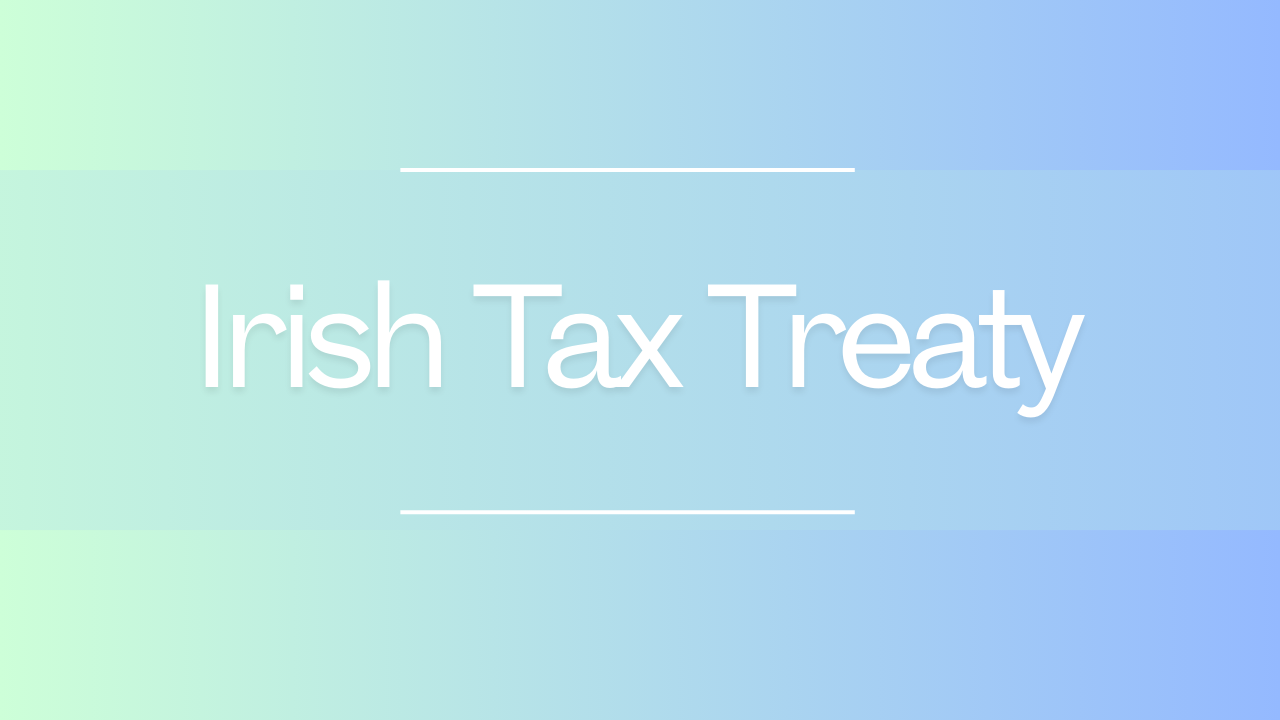- What is a Tax Treaty?
- Irish Tax Treaty Environment
- Key Features
- Benefits for Companies
- Challenges and Considerations
- Case Studies
- Conclusion
Irish Tax Treaty: A Complete Guide
The Ireland Tax Treaty, more appropriately known as the Double Taxation Agreement, forms a part of Ireland's international taxation strategy. This treaty assists in developing economic relations by avoiding the double imposition of tax on an individual's income in various countries and strengthens Ireland as a favorable place for business. In this context, we will look deeply into the details of the Irish Tax Treaty and its importance, involved countries, and how it will impact individual and company entities.
What is a Tax Treaty?
A tax treaty is an agreement between two independent states that defines how taxes are to be levied on income earned in one jurisdiction by a resident of another. These treaties aim to eliminate double taxation-people and companies paying their tax on the same income in more than one country. The main objectives include:
- Avoidance of Double Taxation: Ensuring that income is not taxed by both countries.
- Identification of Tax Residency: This helps determine the right to tax certain income.
- Facilitates Economic Cooperation: In essence Value-added tax, this promotes cross-border trade and investment.
Irish Tax Treaty Environment
Ireland is among the most interconnected countries on the planet when it comes to tax treaties, having signed such treaties with over 70 countries. Among some of the critical countries that have signed tax treaties with Ireland are:
- United States
- United Kingdom
- Canada
- Australia
- Germany
- France
The important reason why these treaties are essential to Irish residents and companies is to enable them to participate in different cross-border economic activities with minimal risks of double taxation.

Key Features of the Irish Tax Treaty
1. Reduced Withholding Tax Rates
One of the most substantial benefits associated with the Irish Tax Treaty is, in fact, the reduced withholding tax rates on dividends, interests, and royalties, among other types of income. According to the DTA, this rate has generally been below the standard rates, which means it is quite financially beneficial for foreign investors.
2. Permanent Establishment Provisions
Permanent establishment, in this respect, is a paramount concept in international tax law. Permanent establishment is a fixed place of business through which the foreign entity conducts its affairs in the host country. The definition under the Irish Tax Treaty prescribes where a foreign business is said to operate through a permanent establishment in Ireland and, thus, is liable to pay income taxation.
3. Residency and Tie-Breaker Rules
Tax residency is important for distinguishing liability as a taxpayer under the DTA. The Irish Tax Treaty embraces tie-breaker rules to deal with dual residency issues of an individual or any other person being deemed a resident of the two contracting states. These are prioritized to include:
- Permanent home
- Centre of Vital Interests
- Habitual abode
- Nationality
4. Exchange of Information
This means that the Irish Tax Treaty encourages information sharing between the tax authorities in relation to sharing intelligence against taxpayers who evade or have evaded taxes. The reason there is transparency within the system of taxation is to ensure there will not be an abusive system of taxation.
5. Non-Discrimination Clauses
It has non-discrimination clauses which are meant to treat residents of a country no less favorably than the local residents in the other country for fair treatment. This is important for any foreign investor as there is equal treatment on tax matters.
Benefits of the Irish Tax Treaty for Companies
There are numerous benefits provided to businesses operating internationally by the Irish Tax Treaty, some of which are:
- Greater Certainty and Predictability
- Attractive to FDI
- International Market Access
- Better Cash Flow Management
Challenges and Considerations
Though there are quite a few advantages to the Ireland Tax Treaty, challenges that businesses have to confront include:
- Complexity in Compliance Matters
- Ever-Changing Shaping Tax Environment
- Risk of Disputes
Case Studies: How the Irish Tax Treaty Works in Real Life
Case Study 1: A U.S. Tech Company Expanding to Ireland
A U.S.-based technology company expands into Ireland. The establishment of a subsidiary in Dublin will reduce withholding tax rates on royalties and dividends paid back to the parent company in the U.S. Careful structuring by the company also avoids the implication of a PE in Ireland and, hence, minimizes obligation to tax.
Case Study 2: An Irish Company Investing in France
The Irish company will reduce withholding tax on dividends by availing its transactions under the Irish Tax Treaty. In that case, what the Irish company does is to structure the investment in a way whereby it retains a higher percentage share than it would have had if it had just followed the French and Irish tax laws.
Conclusion
The Irish Treaty forms the cornerstone in molding the country's international tax environment. Opening its boundaries to trade and investment across borders has made Ireland a favorite international business destination. It is, however, very important to appreciate the fine print that individuals and businesses have to relate with to gain the full benefits of this treaty in a tax-efficient way while remaining compliant with international laws.
In a continually changing international economy, knowledge of the Irish Tax Treaty and its consequences will facilitate making international taxation far easier. Be it an international company or an individual investor, the Irish Tax Treaty offers you a wide scope for financial strategies and can also facilitate growth in international markets.